
Quote from Sean Carroll’s article in the upcoming Routledge Companion to the Philosophy of Physics:
It seems natural to ask why the universe exists at all. Modern physics suggests that the universe can exist all by itself as a self-contained system, without anything external to create or sustain it. But there might not be an absolute answer to why it exists. I argue that any attempt to account for the existence of something rather than nothing must ultimately bottom out in a set of brute facts; the universe simply is, without ultimate cause or explanation.
Carroll goes on to say:
As you can see, my basic tack hasn’t changed: this kind of question might be the kind of thing that doesn’t have a sensible answer. In our everyday lives, it makes sense to ask “why” this or that event occurs, but such questions have answers only because they are embedded in a larger explanatory context. In particular, because the world of our everyday experience is an emergent approximation with an extremely strong arrow of time, such that we can safely associate “causes” with subsequent “effects.” The universe, considered as all of reality (i.e. let’s include the multiverse, if any), isn’t like that. The right question to ask isn’t “Why did this happen?”, but “Could this have happened in accordance with the laws of physics?” As far as the universe and our current knowledge of the laws of physics is concerned, the answer is a resounding “Yes.” The demand for something more — a reason why the universe exists at all — is a relic piece of metaphysical baggage we would be better off to discard.
This perspective gets pushback from two different sides. On the one hand we have theists, who believe that they can answer why the universe exists, and the answer is God. As we all know, this raises the question of why God exists; but aha, say the theists, that’s different, because God necessarily exists, unlike the universe which could plausibly have not. The problem with that is that nothing exists necessarily, so the move is pretty obviously a cheat. I didn’t have a lot of room in the paper to discuss this in detail (in what after all was meant as a contribution to a volume on the philosophy of physics, not the philosophy of religion), but the basic idea is there. Whether or not you want to invoke God, you will be left with certain features of reality that have to be explained by “and that’s just the way it is.” (Theism could possibly offer a better account of the nature of reality than naturalism — that’s a different question — but it doesn’t let you wiggle out of positing some brute facts about what exists.)
….
— Sean Carroll, Why is There Something, Rather Than Nothing? February 8, 2018
 Atheism is the slavish and simple-minded embrace of ignorance. When people call themselves “atheists” today, what they really mean is Christophobes, people with an irrational hatred and fear of Christianity. The arguments they make against Christianity are both bizarre and silly.
Atheism is the slavish and simple-minded embrace of ignorance. When people call themselves “atheists” today, what they really mean is Christophobes, people with an irrational hatred and fear of Christianity. The arguments they make against Christianity are both bizarre and silly.
Consider first the macabre atheistic position that only stupid people believe in God (i.e., Christianity) [straw man argument that no thinking atheist makes]. Until the latter part of the 19th century, virtually all great scientists were extraordinarily devout Christians. Indeed, the scientific method itself was created by Roger Bacon, a Franciscan friar. Buridan, a priest, perfected the scientific principle of impetus and answered many questions about the revolving of our planet. Ockham created the idea, the heart of modern science, that the most simplified explanation for phenomena ought to be considered the truest.
Science long was exclusively the province of devout Christians, and the greatest scientists, like Newton, Maxwell, and Kelvin, were also profoundly religious individuals whose faith was greater than that of most people of their time. Even through the modern age, important scientists have been Christians.
The contrast with atheism is stark. Until the modern age, there were virtually no atheist scientists worth mentioning [yet, many modern scientists are atheists, agnostics, or indifferent towards religion]. Atheism, instead, proved an obstacle to scientific thought. Most prominent was the wiliness of atheists to lie. Lacking any divine overseer to perceive and punish mendacity, virtually all atheists – Nazis, Soviets, Maoists, fascists and our indigenous atheists – have been willing to lie and to conceal if the subterfuge is deemed in the interest of a greater cause.
….
The pattern is clear: atheists are Christophobes who irrationally hate and fear Christians (and also religiously serious Jews) because they hate and fear the idea of a divine and perfect judge of our honor and virtue. Atheists are the dead end of scientific inquiry and rigorous speculative theory because of their phobia. They run from truth as they run from God [if God is chasing atheists, surely he can catch them]. They are profoundly unserious minds whom no one needs to heed.
— Bruce Walker, American Thinker, The Ignorance of Atheism, February 10, 2018
Walker, a chiropractor, lives in Perth, Australia and is on the faculty of Murdoch University.

Warning! Lyrics may contain offensive, vulgar language.
This is the one hundred and fifty-fourth installment in the Songs of Sacrilege series. This is a series that I would like readers to help me with. If you know of a song that is irreverent towards religion, makes fun of religion, pokes fun at sincerely held religious beliefs, or challenges the firmly held religious beliefs of others, please send me an email.
Today’s Song of Sacrilege is Oh Satellite (O Holy Night) by Natalie Windsor.

Warning! Lyrics may contain offensive, vulgar language.
This is the one hundred and fifty-third installment in the Songs of Sacrilege series. This is a series that I would like readers to help me with. If you know of a song that is irreverent towards religion, makes fun of religion, pokes fun at sincerely held religious beliefs, or challenges the firmly held religious beliefs of others, please send me an email.
Today’s Song of Sacrilege is Oh Satellite (O Holy Night) by Natalie Windsor and The National Philharmonic Orchestra.

I recently received a rare polite email from an Evangelical Christian. After sharing his testimony, the letter writer asked me three questions. Rather than privately responding to his questions, I decided to answer them in a post. I hope his questions and my answers will be helpful to the readers of this blog. Please leave your pithy ruminations in the comment section.
Looking back, would you say you truly believed, repented, and tried to live a sanctified life in sincerity?
The short answer is yes. From the age of fifteen through age of fifty, I devoted my life to following the teachings of the Bible. Believing that the Bible was the inspired, inerrant, infallible Word of God, I daily attempted, by and through the grace of God, to put its words into practice. I wasn’t a perfect Christian, but the bent of my life, as John MacArthur says, was towards righteousness. As a pastor, I devoted my life to studying and preaching the Bible, leading people to saving faith in Jesus Christ, and helping Christians put into practice in their lives the teachings of the Bible.
As a follower of Jesus, I came into contact with scores of Christians — as friends, colleagues, and congregants. Not one person ever said that they doubted that I was a Christian. To the person, they believed that I was a saved, sanctified, sold-out child of God. My life as a committed Christian is beyond dispute. That some Evangelicals can’t square my present life with my past is not my concern. I know this: I once was saved and, to use the vernacular of Christianity, now I am lost. Jesus was once my God, Lord, and Savior. Today, he is a fading memory, a mere mortal who lived and died and now lies buried in some nondescript Middle Eastern grave. For further information about my life, please read the posts found on the WHY page.
Is there ever a conviction (currently) that the bible might be true?
True in what way? Factual or historical? Sure. Some of the events mentioned in the Bible are historical, and some of the people actually lived. That said, much of the Bible is myth; at best, stories written by humans meant to explain their understanding of the world. I suspect what you are really asking here is whether I ever have thoughts that the Bible might be supernatural words given to inspired writers by the Christian God. The answer to THAT question is no. I’m an atheist, so I don’t believe in the existence of gods — including the Christian God, so the Bible, by default, cannot be of supernatural origin.
While I still find some of Christ’s teachings — say the Sermon on the Mount and the Beatitudes, and parts of Psalms, Proverbs, and Ecclesiastes inspiring, I view most of the Bible as ancient — oft contradictory — teachings and myths that are largely irrelevant to moderns in the twenty-first century. The Evangelical notion that the Bible — due to its inspired and inerrant nature — is different from all the other books ever written is laughable and cannot be intellectually sustained. Inerrancy is a doctrine built upon hubris, arrogance, and deliberate ignorance. There are too many textual errors and contradictions in the Bible for it to be considered in any way inerrant. Agnostic New Testament scholar Bart Ehrman’s books nail shut the coffin of inerrancy. Some “might” be able to maintain their Christian faith after reading Ehrman’s books, but it is impossible for anyone who has read his books and honestly wrestled with the data to maintain that the Bible is inerrant.
Books by Bart Ehrman
Misquoting Jesus: The Story Behind Who Changed the Bible and Why
Forged: Writing in the Name of God — Why the Bible’s Authors Are Not Who We Think They Are
How Jesus Became God: The Exaltation of a Jewish Preacher from Galilee
Lost Scriptures: Books that Did Not Make It into the New Testament
Lost Christianities: The Battles for Scripture and the Faiths We Never Knew
We just had that “great American eclipse” come by, and I was in awe that the sun and the moon are in our perception the same size (a mathematical anomaly even to the staunchest evolutionist), which makes me see God as the Creator. Can you attribute the complexity of our universe to mere chance?
I am not sure why you would think our perception of the size of the moon in relation to the sun speaks in any way to the existence of the Evangelical God. Why must there be some higher meaning?
The word “complexity” often means something different to Evangelicals from what it means to unbelievers. You, of course, see your version of God in this complexity. Let me ask you this, if the complexity of the universe requires a Creator, and God himself is a complex being, who, then, created God? You might argue that God exists outside of time and space, but there is no evidence for this claim. Such a belief requires faith, and faith is, by definition, beyond or contrary to reason. If God does indeed exist outside of space and time, and Jesus is God, what are we to make of the Bible verses that suggest that Jesus, in space and time, became the son of God?
For the sake of argument, suppose I agree with your premise that the universe with all its wonders suggests that there is a Creator. How could I determine that it was your version of the Christian God who is this Creator? Why is it any more likely that this Creator is your God, than it is any of the other Gods humans have worshiped in the past or presently worship? I can look at a starry night sky and easily understand how someone might conclude that some sort of deistic being created the universe. What is the bridge, however, that gets us from there being A GOD to that God being the Evangelical God? I see no rational argument for it being any more likely that this Creator is the Christian God. This Creator could just as easily be Vishnu, Mbombo, Nanabozho, El, Pango, or an advanced race of aliens who created our “reality” as some sort of video game. Again, this brings us back to faith. You believe what you do by faith. Faith is impervious to reason and rational inquiry, as Hebrews 11 makes clear. I have backed countless Evangelicals into the corner with my challenges of their beliefs (especially about the inspiration and inerrancy of the Bible), only to have them run to the safety of the house of faith. Once faith is invoked, no further discussion can take place. It is only when Evangelical Christians begin to doubt the veracity and authority of their foundation — the Bible — that faith can be overcome. It is no surprise, then, that Evangelical preachers lie about the nature of the Biblical text. They know if congregants begin to doubt that the Bible is what their pastors say it is, down comes the house of cards. Once Evangelicals dare to consider that they might be wrong and that what they have been taught their entire lives might be false, then, and only then, can they take an honest, open, follow-the-evidence-wherever-it-leads look at the Biblical text and the claims of Christianity. Most often, such intellectual pursuits lead to liberal Christianity or, as in my case, atheism. My recommendation, then, for readers is not to take that step if they are not ready to question their faith in earnest.
Bruce Gerencser, 66, lives in rural Northwest Ohio with his wife of 45 years. He and his wife have six grown children and thirteen grandchildren. Bruce pastored Evangelical churches for twenty-five years in Ohio, Texas, and Michigan. Bruce left the ministry in 2005, and in 2008 he left Christianity. Bruce is now a humanist and an atheist.
Connect with me on social media:
Your comments are welcome and appreciated. All first-time comments are moderated. Please read the commenting rules before commenting.
You can email Bruce via the Contact Form.

Lawrence Krauss, 63, is an American-Canadian theoretical physicist and cosmologist who is Foundation Professor of the School of Earth and Space Exploration at Arizona State University, and director of its Origins Project. In the video that follows, Krauss answers questions about science, the scientific method, and the origins of the Universe. Enjoy!
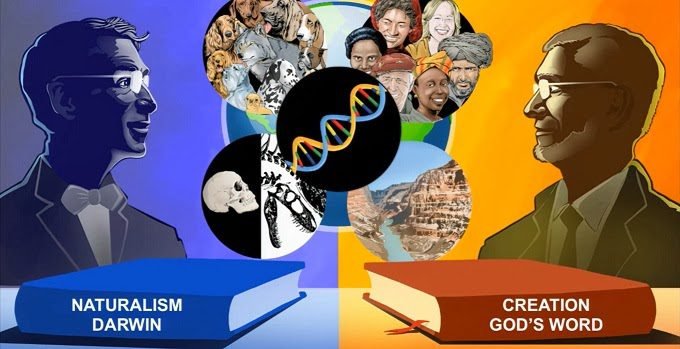
Fundamentalist Christian:
Everything from the creation to the resurrection became possible once the sciences took on their true form and place, as mere human experience writ large.…Once the people built a tower to the sky; it did little for their spiritual well being. So my reading of the Bible is painfully literalistic. When I see it read that Jesus Christ has physically risen from the dead, I take it as teaching what it is saying. I don’t have a poetry that can carry that event without some real blood and asphyxiation. Without a real death and resurrection I could not be a Christian, the way some cannot be a Christian with it. I don’t, contrary to many, have any good reasons to think that something like that cannot happen, even if I have good reason to understand that it does not usually happen.
There are no rules of the universe that say, “people can’t rise from the dead.” Those kinds of rules are limitations drawn from the narrow breadth of human experience and common habit. There is no evidence for them.
Gary:
If we follow this line of thinking, no claim, regardless of how fantastical, should be dismissed by modern, educated people if the claim comes from someone’s holy book. Anything is possible, so nothing can be ruled out. If the literal interpretation of a passage in the Christian Bible says that the universe was created in six days, it was created in six literal days, regardless of what science says on that issue.
Science states that the earth revolves around the sun, but that isn’t what Joshua seemed to believe in the Old Testament. If we follow our Christian’s thinking above, it is perfectly rational to believe that the sun DOES revolve around the earth; the apparent evidence suggesting heliocentricity is simply a mirage, created by God to humble and confuse the wise. So maybe we should force NASA and other governmental space and science agencies to abandon heliocentricity based on the literal reading of this biblical text.
How can a modern society function with such a mindset? Imagine if all US government agencies were forced to yield to those who hold a literal interpretation of every statement in the Old and New Testaments as historical fact. What a disaster! Life would be chaos! We would revert to a primitive people, afraid of our shadows for fear of conniving devils and demons.
No one can claim that science, and the scientific method used by science, is the one and only source of truth. But we can claim that the scientific method, to date, has proven to be the most reliable method of discovering how our universe operates; far better than the literal interpretation of the Bible or any other ancient holy book.
As for me and my house, we will stick with science!
— Gary, Escaping Christian Fundamentalism, Should Christians Believe Biblical Claims Which Contradict Scientific Evidence?, October 2, 2017
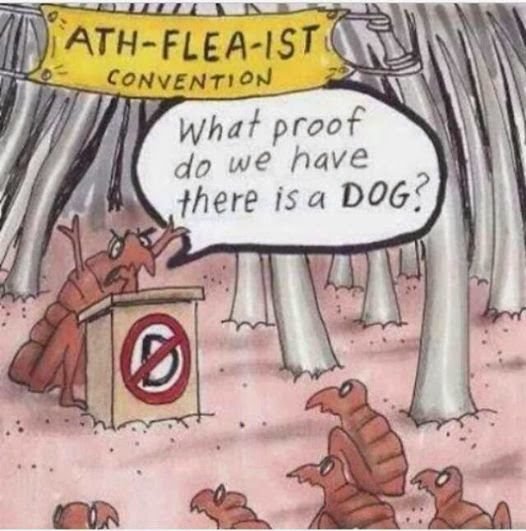
I am often asked what it would take for me to believe in the Evangelical God. Is there anything that would cause me to discard atheism and embrace the God whom Evangelicals say is the Creator of everything and the savior of everyone who puts their faith and trust in Jesus Christ? Am I so set in my atheistic/humanistic ways that there is nothing that could persuade me to return to the Christianity I abandoned eight years ago? Simply put, what will it take for me to fall on knees and repent of my sins, professing that Jesus Christ is my Lord and Savior?
Many Evangelicals, of course, believe that no amount of evidence would be enough to convert someone such as myself. I am a reprobate, an apostate, a sworn enemy of the Evangelical God. I have crossed the line of no return. My destiny is already settled, with a first-class accommodation in Hell and the Lake of Fire awaiting me after I die. According to the Bible, I am the pig that has returned to the mire and the dog who has returned to his vomit. I have trampled under my feet the blood of Jesus, and there remains no further sacrifice for my sins. Christian evangelizers are told not to waste their time on the Bruce Gerencsers of the world. Let them go to the hell they so richly deserve!
Other Evangelicals think that I am still saveable. With God all things are possible, they say. Imagine what a testimony to God’s wonderful grace it would be if the preacher-turned-atheist Bruce was brought low before the thrice-holy God and saved from his sins. Years ago, I remember being taught in evangelism class that the best way to reach a community for Christ is to find the meanest sinner in town and lead him to Christ. While I am not a mean person, I am considered the village atheist, a man who hates God and Christians. Get me saved, and r-e-v-i-v-a-l is sure to follow. Or so local Christians think, anyway.
Many Evangelicals believe that God has given me all the evidence I need in order to believe. The Evangelical God has revealed himself to me through creation, conscience, and divine revelation (the Bible). God has done all the revealing he intends to do. If this is not enough for me, I can go straight to hell.
Wait a minute, what is there in creation that proves to a rational, reasonable man that the Evangelical God is one true God, and that forgiveness of sins and salvation are through Jesus, the second God of the Trinity? When I peer into wondrous darkness of a starry night, I am filled with awe and wonder. When a harvest moon rises in the east, giving off its larger-than-life orange glow, I am reminded of the awesomeness of the universe. All around me I see wonders to behold. As a professional photographer, I often spend time peering at the complexities and beauty of nature and wildlife. Even the feral cats resting underneath the nearby post office box cause me to pause, watch, and enjoy. Everywhere I look, I see things that cause me to stop, reach for one of my cameras, and shoot a few photographs. Not far from where the aforementioned cats hang out, there are sheep and goats who often entertain me when I have time to stop and take their pictures. And don’t get me started when it comes to my family. There are times when everyone is over for a holiday — all twenty-one of us, aged two to sixty — that I quietly sit and watch my children and grandchildren. I think to myself, man, am I blessed. With all the health problems I have, I am lucky to be alive, fortunate that I have the privilege to love and be loved. Does all of this, however, say to me, the Evangelical God is real, that Christianity is the one true religion? No, it doesn’t. At best, all that I have experienced tells me that perhaps there is some sort of divine power, a God of sorts, that has set in motion life as we know it. Perhaps — though I doubt it — there is a deistic God who created the universe and then went on vacation, leaving the future of planet earth and its inhabitants up to us. This is the God of some of the people who read this blog, and while I don’t believe in their God, I do understand how they came to believe as they do, and I respect their viewpoint. And they are okay with my unbelief, as is their God.
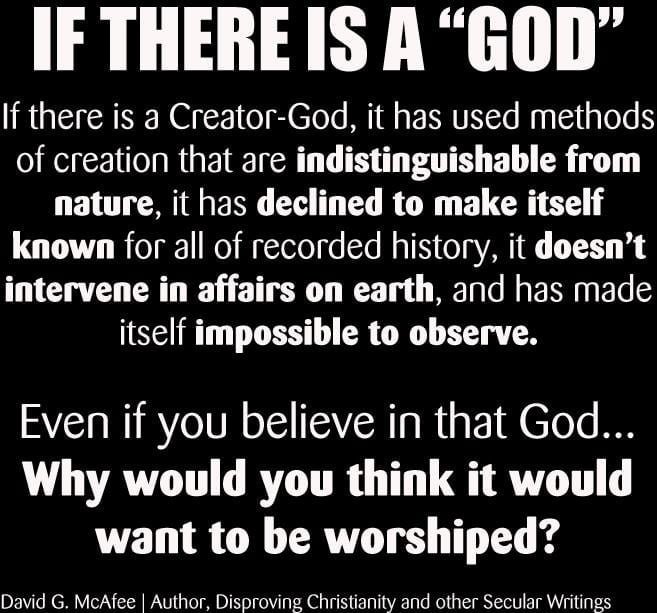
I have yet to have an Evangelical satisfactorily explain to me how anyone can rationally surmise that their God is the one true God just by looking at starry skies or biological world. I am willing to concede, as I mentioned above, that it is possible to conclude that some sort deistic creator put the world into motion and then said, there ya go, boys and girls, do with it what you will. But, pray tell, what evidence is there for this generic creator God of sorts being the Evangelical God? Well, the Bible says ___________, Evangelicals say, and therein lies a big, big problem. Evangelicals are, for the most part, literalists. When they read the creation account recorded by an unknown author in Genesis 1-3, Evangelicals conclude that their God created the universe in six twenty-four days, exactly 6,022 years ago. Yes, I am aware that some Evangelicals are NOT young earth creationists, not that this really matters. Whether young earth or old earth or any of the other creation theories espoused by Evangelicals, they believe that the foundational authority is the first three chapters of Genesis.
Using the Bible as a tool to prop up what can be viewed with human eyes only causes greater doubt and unbelief. Why? Because what the Bible says about the universe runs contrary to what science tells us. Astronomy, geology, cosmology, archeology, and biology all tell us that what the Evangelicals believe the Bible says about the universe is false. Of course, Evangelicals are taught that the Bible is the final authority on everything, including how and when the universe came into existence. When science conflicts with the Bible, the B-i-b-l-e — the inspired, inerrant, infallible Word of God — not science, is always right. As science continues to push creationism closer and closer to the dustbin of human history, Evangelicals are forced to defend beliefs that are no longer rationally defensible. So anyone telling someone such as myself that creation — when viewed through the lens of the Bible — proves the existence of the Evangelical God will be met with ridicule and laughter.
The Bible, despite Evangelicals believing otherwise, is no longer a credible source of proof for the existence of God. Evangelicals believe that divine revelation (the Bible) is another way that God reveals himself to us. Unfortunately, thanks to the internet and authors such as Bart Ehrman and Robert Price, the Bible can no longer be used as proof for anything. Now that there are countless blogs and websites dedicated to deconstructing the history and teachings of Christianity and the Bible, it is increasingly hard for Evangelicals to continue to promote and sell the party line. The Bible is not worthless. There are teachings, maxims, proverbs, and such that people, religious or not, find encouraging and helpful. The same, however, could be said of a plethora of religious texts, so the Christian Bible is not special in this regard.
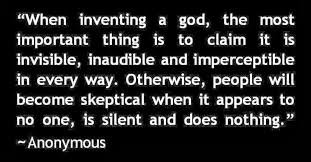
Having read the Bible dozens of times from cover to cover, spending thousands of hours studying its words, books, and teachings, I see nothing that would convince someone not already initiated into the Evangelical cult that the Christian God is the one true God and all other Gods are false. The fact remains that the Bible is not what Evangelicals claim it is, and the only people who believe that the Bible is some sort of supernatural book are those raised in religious sects and tribes that embrace inerrancy. Such people believe the Bible is inspired and inerrant because they either don’t know any better or they refuse to change their beliefs — facts be damned. Extant information, available to all who can read makes one thing clear: the Bible is not what Christians say it is.
Evangelicals also believe that their God reveals himself to humans by giving all us a conscience. Supposedly, the conscience that God gives us is some sort of moral regulator. According to Evangelicals, everyone is born with an innate understanding of right and wrong. God, they say, has written his law on our hearts. If this is so, why do parents need to teach children right and wrong? Why is it that geography and tribal identification, not God, determines moral and ethical beliefs? If the Evangelical God’s law is imprinted on everyone’s hearts, shouldn’t everyone have the same moral beliefs? Of course, they don’t, and doesn’t this mean that there must be some other reason(s) for moral belief other than God? That atheists are moral and ethical without believing in God is a sure sign that these things come from something other than a deity; things such as genetics, parental training, tribal influence, education, and environment.
The fact is, for atheists such as myself, creation, conscience, and the Bible do NOT prove to us the existence of the Evangelical God. Sorry, Evangelicals, I have weighed your evidence in the balances and found it wanting. What then, Bruce would it take for you to believe in God? Is there anything that God can do that would cause to believe? Sure, there is. Let me conclude this post with several things the Evangelical God could do to prove to me his existence. All of these are within the ability of the I can do anything Evangelical God:
- Raise my mother from the dead so she can love and enjoy the grandchildren she never got to see.
- Heal me. Waking up one morning — just one — without pain would certainly cause me to reconsider my view of God.
- Striking Donald Trump dead the next time he lies would certainly be a sign of God’s existence.
- Causing the Cincinnati Reds to go 81-0 the last half of the season, Joey Votto hitting 80 home runs, Billy Hamilton hitting .350 and stealing 140 bases, and the Reds winning the World Series would definitely make me believe in God’s existence.
- Causing the Cincinnati Bengals to go 16-0, winning three playoff games and the Super Bowl would also make me wonder, is there a God?
- On a more serious note, God ending violence and war, hunger, sickness and disease, would certainly get my attention. Unfortunately, I’ve been told that God is too busy helping Grandmas find their keys and Tim Tebow become a major league baseball player to be bothered with human suffering.
- And finally, God could just send Jesus to my house. That certainly would do the trick. However, I fear once I tell Jesus what has been going on in his name for the last 2,000 years that he might say, Dude, I don’t blame you for not believing in God. I wouldn’t either, but since my Dad is God, I have to believe whether I want to or not.
Truth be told, I doubt there is anything that can be said or done that would convince me of the existence of the Evangelical God. I have carefully weighed the extant evidence and found it wanting. Since it is unlikely that any new evidence is forthcoming, I am comfortable with saying that the Evangelical God is the mythical creation of the human mind, and I need not fear or obey him.
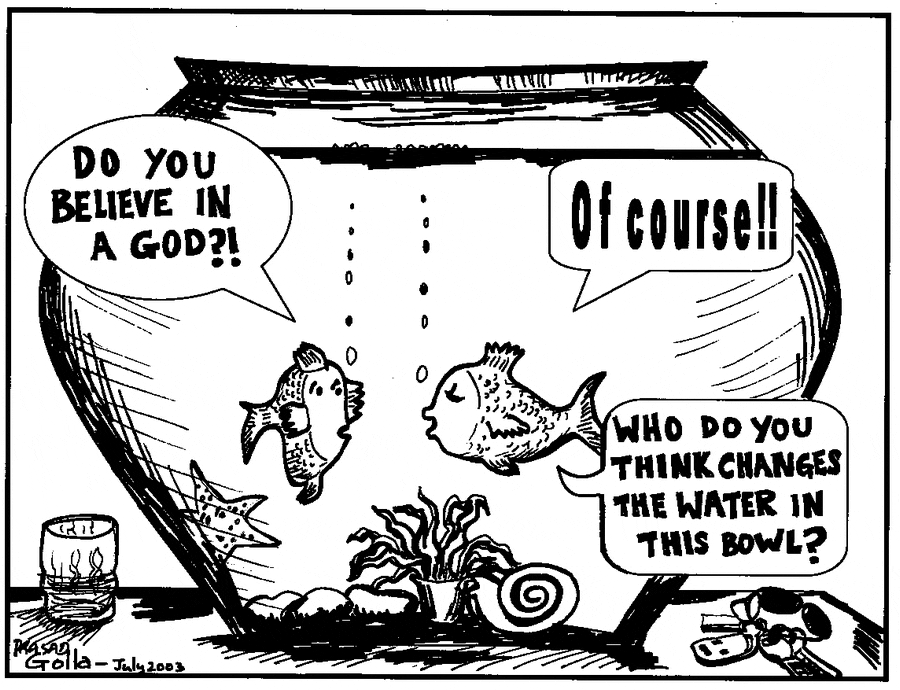
Now, I’m glad the Bible’s not a textbook of science like those used in public schools, because it would change all the time. Many ideas have come and gone. For example, most of the evolutionary beliefs used by scientists in the transcript of the Scopes Trial have been abandoned—but God’s Word remains the same. It is the infallible Word of God—the true history book of the universe.
….
Secularists often accuse us of reading Genesis literally but not other portions of the Bible. We point out that we should read the Bible naturally. There is history (e.g., Genesis), poetry (e.g., Psalms), prophecy (e.g., Isaiah), and so on. Different genres of writing require different interpretative methods. Historical documents such as Genesis are not intended to be taken figuratively.
Secularists also attack Christians for not following Old Testament laws. But most secularists have no understanding of the Old Covenant and New Covenant—and they don’t want to. They want to distort and attack the Word.
I’m burdened for those described in the Bible as “having no hope and without God in the world”, which is why we boldly proclaim truth. My challenge to secularists is this: the evidence of creation is obvious, so “do not be unbelieving, but believing” and “lay aside the deeds of darkness and put on the armor of light”.
When you reject God’s Word in Genesis and interpret it through the lens of man’s fallible, opinionated word, more and more compromise is sure to follow. You see, when you start compromising in one area of the Bible, it isn’t long before compromise shows up in other areas. My challenge to all believers is this: believe all of God’s Word!
People are born and die, but “the word of our God stands forever” — and no person can ever change that! Secularists can’t change this: “The entirety of Your word is truth, And every one of Your righteous judgments endures forever”.
Many people try to change God’s Word, particularly in Genesis, but “forever, O Lord, Your word is settled in heaven”.
— Ken Ham, Answers in Genesis, Is the Bible a Science Textbook?, December 18, 2016

